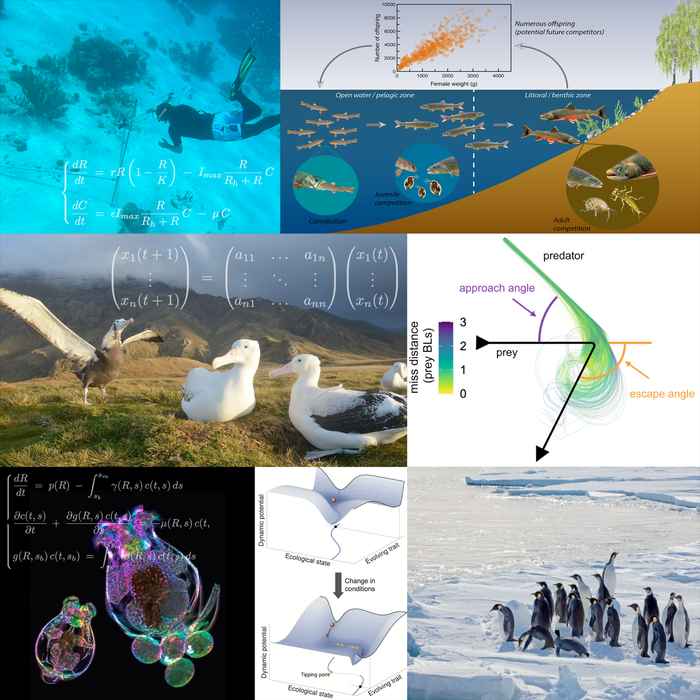Theoretical Ecology and Evolution

We utilize a variety of mathematical and computational models, including differential equations, matrix population models and agent-based models, with a range of methods and approaches, such as stochastic processes, bifurcation theory, matrix algebra, sensitivity analysis and machine learning.
An important contribution of our research is the development of new analytical and computational methods for the analysis of individual behavior, population dynamics and drivers of emergent patterns. This includes sensitivity analyses for population projection models and ecological and evolutionary bifurcation analysis for physiologically structured models. Our research is not taxonomically restricted, and includes plants, animals, and humans, as well as pathogens and malignant cells.
Staff
Research staff
Postdoctoral Researchers
PhD candidates
Research Projects
Some examples of the projects where we have or had a leading role include:
- Rules of life: How prey evade bigger, faster, stronger predators. Predators are generally much bigger, faster and stronger than their prey. Despite this, the majority of attacks are unsuccessful. A general explanation for this paradox has long eluded ecologists. As a result, the mechanisms that underlie rates of interactions between predators and their prey – one of the most important quantities in ecological theory – remain poorly understood. In this NWO-Vidi project (2022-2027) we combine high-resolution field observations, machine learning, and mathematical models to reverse engineer the behavioral rules that prey and predators use to guide behavior during interactions. By identifying these “rules of life” and using mathematical models to explore their consequences, we seek to resolve the paradox of how prey evade much bigger, faster, stronger predators and to generate a new, tractable theory of predator-prey interactions.
- FORMKIN: The formal demography of kinship and family. An ERC Advanced grant (2018-2024) that aims to develop a comprehensive mathematical model for kinship, applicable to any kind of kin, in any population, based on any kind of age-classified or multistate structure. The project will yield predictions for deterministic and stochastic properties of kin and kin characteristics at the individual, cohort and population level, as a function of population growth, and provide a link to population projections.
- PANDORA: PAradigm for New Dynamic Ocean Resource Assessments and exploitation. This HORIZON 2020 project (2018-2023) aims to improve assessments and projections of changes in fisheries resources and to advise on how to secure long-term sustainability of EU fish stocks. The project will elucidate tradeoffs between profitability and the number of jobs in fisheries fleets and provide recommendations on how to stabilize the long-term profitability of European fisheries. It will furthermore develop a public, internet-based resource toolbox to support ecosystem-based fisheries management.
- INDSTOCH: Individual stochasticity and population heterogeneity in plant and animal demography. An ERC Advanced grant (2013-2018) that addresses the role of individual stochasticity and inter-individual heterogeneity in plant and animal demography. The project is developing new models, extending the techniques of demographic analysis, and analysing field and laboratory data.
- Ecological and evolutionary analysis of lifetime reproductive output: theory and applications. A NWO Open funded project (2014-2018). Lifetime reproductive output is an important fitness component and reflects the entire life history of the organism (growth, development, survival, and reproduction). This project is developing new theoretical models for lifetime reproduction and applying them to data on plants, animals, and humans.
- ECOEVODEVO: Eco-evolutionary dynamics of community self-organization through ontogenetic asymmetry. An ERC Advanced grant (2013-2018) that investigates the evolutionary and ecological consequences of differences among individuals associated with the differences in their life history stage for population dynamics and life history evolution. Such individual differences translate into asymmetric interactions between individuals in different stages of their life history, for example, asymmetric competition for resources between juveniles and adults. In turn, these asymmetric interactions play important roles in the self-organization of ecological communities and the evolution of life cycle complexity.
Master’s research projects
Some examples of the master’s thesis topics we had in the past:
- The guidance law of predatory fish (Carangoides ruber, Caranx crysos) during the attack. Xuening Li. Supervisor Benjamin Martin;
- Influence of Phenotypic Traits and Environments on Capture Success in the Lab and in Nature. Yauchen Wu. Supervisor Benjamin Martin;
- Exploring drivers of feeding level in North Sea fish stocks. Quinten Mudde. Supervisor Jasper Croll;
- Parasite persistence in Daphnia populations through changes in individual energy densities. Sara Neven. Supervisor André de Roos.
Other research areas: